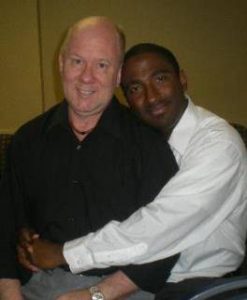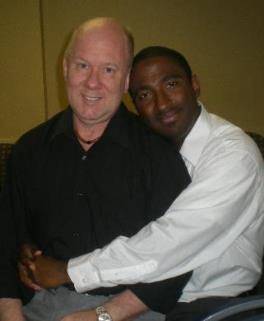Renowned LGBT Activist Stephen Parelli Shares Heartbreaking Ordeal with Dying Sister who Banned him from attending her Funeral on the Basis of his Sexuality
Like most LGBTI persons across the world, Rev Stephen Parelli’s coming out was met with mixed feelings especially by family members. While some, over the years, have come around and bridged the gaps in their relationships, his elder sister still unwaveringly refuses to have anything to do with him.
One would think that being given only three months to live would give his sister Diane Morrell time to reflect and at least get on talking terms with Rev Parelli. But eighteen years later, and having turned down several attempts of a make-up, Morrell still insisted she did not want to have a conversation with her brother unless he repented and changed his ways.
However, she had one final request-she did not want Stephen to attend her funeral. Heartbroken by this final blow and questioning her sister’s beliefs, he decided to share the ordeal of trying to make amends with his sister which has since gone viral.

Below is the unedited blog letter as shared by Rev Parelli.
“Promise me you won’t come to my funeral,” said the evangelical sister to her gay Christian brother
Upon learning, today, that my sister aged 61, just a year younger than me, was told she has three months to live, that her four-year battle with cancer is lost, I debated with my husband and a couple other family members if I should give my sister an unannounced, surprised visit, hoping for a positive reception. I’m just sanguine enough to hope that just maybe her realization of her imminent death might make her open to the idea of seeing me.
BRONX, NEW YORK. by Rev. STEPHEN PARELLI. APRIL 26, 2015
About three years earlier, when I was scheduling my calendar to be in her area to attend a major conference, she had refused my request for a planned visit. When a common college friend, thinking he could help, phoned my sister and offered my sister a visit from the two of us – from her college friend and her estranged brother – even that didn’t pry the door open.
My sister (an evangelical ordained minister’s wife who had attended the same Bible college I had) had severed her relationship with me in 1997 when I first publically came out as gay and Christian and had joined my life with my same-sex life-partner, now my legal husband.
When I called her three years ago, she was stone cold, calculating, and insistent that I never call her again. (I had forgotten that last part – don’t ever call again.)
It didn’t take long for me to reverse my decision, that a surprise visit was Hollywoodish: you know, the movie-ending good feeling that it will all fall together once she sees me or knows I’m actually there. Fortunately, it was my unfaltering knowledge, and willingness to be realistic, of fundamentalists and religious extremists that tempered my jump-on-the-plane-this-can-happen attitude. So, instead of a surprise visit, I started my love-venture with my sister with a simple but earnest and heart-felt phone call.
It was the right choice (over against planes, car rentals, and hotels), and, of course, to no avail.
She was as strong as ever in her denouncements of me over the phone. She was religiously combatant – or “militant” as my husband later said who listened in on the call.
I began the conversation by telling my sister I loved her; that my thoughts were with her and her family; that her (other) brother had informed me of the unsettling news of her imminent death; and that if her health was strong enough to permit a visit, I would like very much to see her for an hour at most, but if she felt her strength and time were needed for her immediate family, I understood; but that either way I wanted her to know I love her.
With a tone of resolve, and with an evangelistic door-to-door pitch that was love-less, as she did three years ago and as if the script had been once again rehearsed as if knowing her gay, sinning brother would phone her, she told me the following: (1) she does not trust me because, as she claims it, I have an agenda (I am a worldwide human rights activist for LGBT people, and for her part, she will say this blog proves her point that I have an agenda); (2) she knows where she is going when she dies and she has peace about it; and (3) – without missing a beat – she also knows, with certainty, where I am going when I die and that I need to repent and change.
That was basically the extent of our phone call, although she did share with me a bit about her present failing physical state, and she did decline my request for a visit without any love lost and without any hint of regret, or apology, or expression of a like desire to see me. It was cold, business-like, and somewhat filled with a sense of disgust, resentment and hard feelings.
The major history between us is this (besides my living in homosexual sin which has created the present day Sodom-and-Gomorrah reason why God will destroy America): she did not like that I had taken my homophobic Baptist preacher father to task before his denominational council and his family members, charging him with unethical conduct and with authoring lies intended for my character assassination, alienating my young teen children from me by telling them stories he authored based on half-truths he had created by which he thought to forever personally destroy me before my children. My sister never forgave me for seeking to set my good reputation straight before the pastor-peers of our father and before our family members, and for having publically connected the dots that indicate that my father is a closeted homosexual, or at the very least, greatly troubled by his own unyielding homoerotic feelings.
For my sister, I had all the more become, by speaking truth to the outside world about our malicious father an object to be rejected and she saw herself as ethically justified in doing so.
Following my phone call with my sister, I was skyping my daughter (who in an earlier conversation, on Skype, sobbing and with her head bent into her hand, had said, “I’m crying for you, dad. Why does your family treat you so?”) when my cell phone rang.
It was my sister. I saw her name on the screen. I was a bit elated. She was calling me. There must have been a change of heart, to some degree, so I thought.
“Hi, Diane,” I said with much less fear in my heart than when I had called her minutes earlier.
But her tone of voice told me we were still in the same zone of this-is-how-to-treat-God’s-abominations.
“You said you love me,” she said. It was a trap, I knew it already. Her tone was ridged and cold.
“Yes, I do.” I said, giving in to her manipulative lead which she had learned to do from our father, controlling the conversation with questions rather than simply expressing one’s desire by speaking declarative statements.
“Then can you do something for me, since you say you love me” she continued to weave.
“Yes, I will if I can.” I said, knowing this wasn’t a call for reconciliation.
“Then I am asking you to promise me you will not attend my funeral.”
I told her, interestingly enough, that my husband and I had already discussed the fact that our presence at her funeral would, most likely, create more negative reaction than positive response.
Jose and I had taken inventory: My sister’s two (very evangelical) adult children(one a Bbaptist minister Rev. Dr. Matt Morrell) do not acknowledge us – ever – birthdays, Christmas, other times. My evangelical parents have publically disowned us (my Baptist-preacher father, a few years back, saying he would take a bat to my head if I were to attend his mother’s funeral). When my sister’s husband (a college mate of mine) had suddenly passed away two years earlier, my husband and I were not wanted then to be at the funeral (I was in Sweden at a conference so it wasn’t too complicated to not attend).
“Yes,” I told my sister, “I will give you this gift. I promise you I will not attend your funeral.”
Not even a thank you or a word of appreciation from her; not even the slightest admission that this was difficult for her to ask. No, instead, it was all business; the agreement was signed.
When I phoned my daughter, who blatantly asked is there any Christianity in our family, I candidly told her there is a higher road but her family seems to have sadly missed it: my sister could have said, “Steve, I’m hoping my family will show you and Jose grace and kindness when you attend my funeral. I know it won’t be easy for them, and I know I haven’t helped pave the way. But I’m asking them now to love my brother the way I should have loved him. Death is a game changer; life is short; love and understanding are the gifts we give each other.”
But the angel of death had no such message to whisper earthward to my sister.
As I reflected with my husband Jose, I told him something from my sister-brother history that is a bit of a truth-teller about my sister, as I look at it now, and something 20thcentury evangelical American Christianity could not altar, which is my sister’s personality traits fixed more by her environment and less by a transforming religious experience.
You see, my sister’s life is ending the same way she had commenced her high school days with me. We were just one grade apart in high school. When I was a junior or sophomore, she told me, again in cold calculating words, that I was never to speak publically with her in our high school hallways whenever she was with her marching band friends or her friends in general. I was mortified. When my brother came along as a freshman in high school, a year younger than my sister, it was just the opposite. He was cool, very good looking, and popular with people. My sister did everything she could to be seen with him. But with me, I was told to stay away, and the glare coming from her eyes and the facial expression that could kill, kept her instructions of rejection ever before me.
And so my dear sister, I grant you this gift one more time, right out of our high school handbook, the one you wrote for me and you – yes, I promise I will not attend your funeral – I will stay away from all your friends, family and playmates, and I will forever wonder what Christ it is you follow to whatever peaceful place beyond the grave you testify to know and I will wonder forever if this – the New Testament good news as you have announced it to the world throughout your evangelical days – is, in fact, the real good news.




